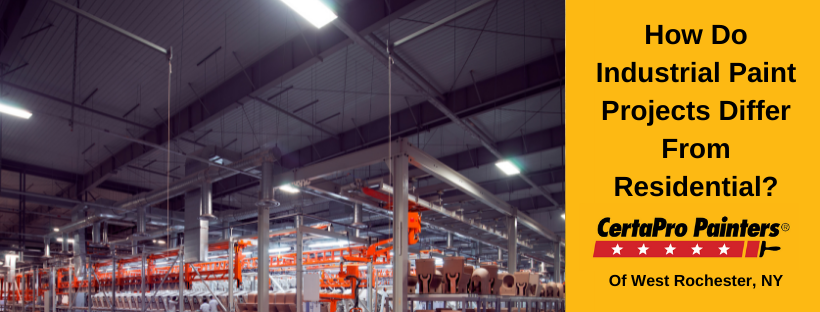
How Do Industrial Painting Projects Differ From Residential?
Posted on May 1, 2022
How are Industrial Projects different from residential?
Industrial facilities & warehouses have heavy traffic, and lots of action usually around the clock. The wear and tear on these spaces are so much more than a home. Most factories have hundreds of employees working across 3 shifts. This can cause a lot more paint deterioration just due to the amount of traffic and the type of work going on within the building.
Industrial & businesses require additional planning & preparation to complete the project. Because industrial spaces have many different working parts (depending on the type of work they do & how they do it), very high traffic areas & lots of machinery, these things need to be included in the repainting process too.
This is why you should ALWAYS hire professional painters to paint the interior & exterior of your business. There are insurance issues, building codes & chemical concerns that only the Pros know how to deal with correctly. Professional painters also have access to, and knowledge of, the appropriate types of paint covering required for these types of projects. It is much easier to breathe easy because you know CertaPro Painters are handling the job.
What type of paint is usually used in an Industrial Painting Project?
Different Types of Industrial Paint
There are many different types of industrial paint. The primer, paint, or sealant that is ideal for your project depends on the environment your application is going to be placed in, the type of product you’ll be storing, and many other factors.
Here are some examples of the most common types of industrial paint:
100% Polyurethane Coatings
Polyurethane industrial paint coatings excel at abrasion resistance and are used to protect against harsh environmental conditions and wear and tear.
Aromatic polyurethanes are used for steel parts that will be submerged in water but are less common in potable water tanks.
Epoxy Coatings
Epoxy coatings effectively resist corrosion, abrasion, and weathering. This makes them ideal for painting steel that is placed in harsh operating environments.
This type of paint is also resistant to extremely high temperatures, so can be used on tanks that store hot products or are exposed to extreme heat.
One disadvantage of epoxy paint is that it will chalk over when exposed to too much sunlight. This is why epoxies are most often used in submerged or interior projects
Industrial epoxy coatings are often applied in three layers. First, a primer is applied, like a zinc primer. Then the epoxy is sprayed on. Finally, an epoxy binder or polyurethane topcoat is applied to finish the coating process.
Zinc-Rich Coatings
Zinc coatings provide a polymeric and galvanic barrier, making them extremely effective for steel parts that require scraping and abrasion resistance.
This robust protection comes from the zinc dust used in the paint, as well as the polyurethane or epoxy binders used to create it.
Acrylic Coatings
Acrylic industrial protective coatings are most commonly used on automotive and architectural projects due to their corrosion resistance and high-gloss characteristics. Acrylic paint is less common for other industrial applications like tanks, reservoirs, and penstock.
Metalized Coatings
Metalizing is the process of melting down metal wire, atomizing the molten material, and then spraying it onto a product’s surface to create a strong coating.
This heavy-duty coating type can be formed using bronze, aluminum, nickel, chrome, stainless steel, zinc, and tungsten. Also, metalized parts are typically seal-coated to increase their corrosion resistance.
Conclusion
Industrial projects definitely require additional skills and competence, but CertaPro painters have it covered. We are experts when it comes to completing the largest industrial painting projects, but we also know how to work with smaller businesses too.
When you’re ready to start an industrial painting project, give CertaPro Painters® of West Rochester, NY a call at 585-200-5007 or schedule a free estimate online today!





